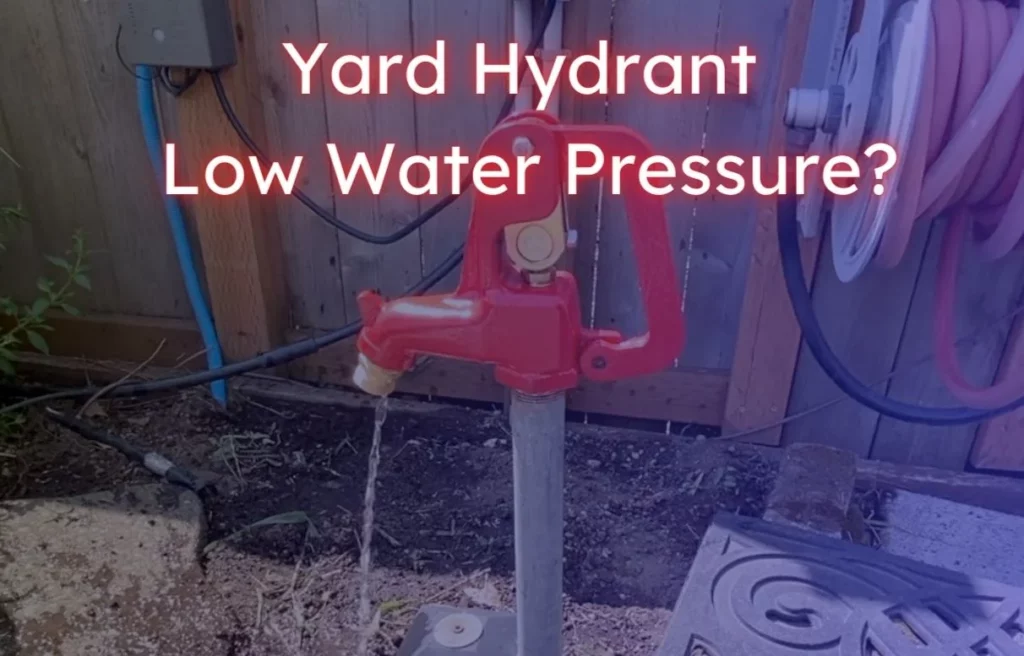Low water pressure in a yard hydrant can be a frustrating problem, especially if you rely on it for watering your lawn, washing your car, or filling up your pool. There are a number of possible causes of low water pressure in a yard hydrant, including:
- A clogged water main
- A faulty water pressure regulator
- A frozen yard hydrant
- A leak in the plumbing
- A problem with the well pump (if you have a well)
Causes of low water pressure in yard hydrants

Low water pressure in yard hydrants can be caused by various factors. Some of the common causes are:
Clogged pipes:
Over time, pipes can become clogged with sediment, rust, or other debris, which can restrict the flow of water and cause low pressure in yard hydrants.
Faulty valves:
If the valve in the yard hydrant is not functioning properly, it can cause low water pressure. A faulty valve can either restrict the flow of water or allow water to leak out, resulting in low pressure.
Leaking pipes:
If there is a leak in the pipes leading to the yard hydrant, it can cause low water pressure. The water that is supposed to flow to the hydrant may be leaking out before it reaches the hydrant.
Water supply issues:
If there is a problem with the water supply, such as low water pressure from the municipal water system or a malfunctioning well pump, it can cause low water pressure in the yard hydrant.
Frozen pipes:
In colder climates, frozen pipes can cause low water pressure in yard hydrants. When water freezes in the pipes, it can block the flow of water, resulting in low pressure.
How to fix low water pressure in a yard hydrant
Clean the aerator:
Unscrew the aerator from the end of the hydrant spout and soak it in vinegar for a few hours. Then, use a toothbrush to scrub away any dirt or debris. Rinse the aerator thoroughly with water and screw it back onto the spout.
Replace the washer:
Turn off the water supply to the hydrant. Then, use a wrench to remove the hydrant spout. Remove the old washer and replace it with a new one. Make sure that the new washer is the correct size and type for your hydrant. Reassemble the hydrant and turn the water supply back on.
Clean the valve seat:
Turn off the water supply to the hydrant. Then, use a wire brush to clean the valve seat. Be careful not to damage the surface of the valve seat. Once the valve seat is clean, reassemble the hydrant and turn the water supply back on.
Thaw a frozen hydrant:
If the hydrant is frozen, you can use a hair dryer or heat gun to thaw it out. Be careful not to overheat the hydrant, as this can damage it. Once the hydrant is thawed, turn on the water supply to check the water pressure.
Troubleshoot a problem with the water supply:
If the water pressure in your home is also low, you will need to contact your water utility company. They will be able to investigate the problem and make the necessary repairs.
Can a High Pressure Tank Cause Low Water Pressure in Yard Hydrants?
A high pressure tank can indeed cause low water pressure in yard hydrants. When the pressure tank is set too high, it can result in decreased water pressure in the yard hydrants, affecting their functionality. It’s important to be mindful of the potential consequences of a pressure tank set too high.
How can I prevent low water pressure in my yard hydrant in the future?
There are a few things you can do to prevent low water pressure in your yard hydrant in the future:
- Make sure your water main is properly sized. If your water main is too small, it won’t be able to deliver enough water to your yard hydrant, especially if you have other water-using appliances running at the same time.
- Keep your water main clear of debris. Dirt, leaves, and other debris can build up in your water main over time, restricting the flow of water. To prevent this, have your water main cleaned regularly by a qualified plumber.
- Check your water pressure regulator. A water pressure regulator helps to ensure that the water pressure in your home is consistent. If your water pressure regulator is not working properly, it can cause low water pressure in your yard hydrant.
- Insulate your yard hydrant. If you live in a cold climate, it is important to insulate your yard hydrant to prevent it from freezing. A frozen yard hydrant can cause low water pressure or even burst.
- Repair any leaks in your plumbing. Leaks can waste water and reduce the water pressure in your home, including at your yard hydrant.

Leave a Reply